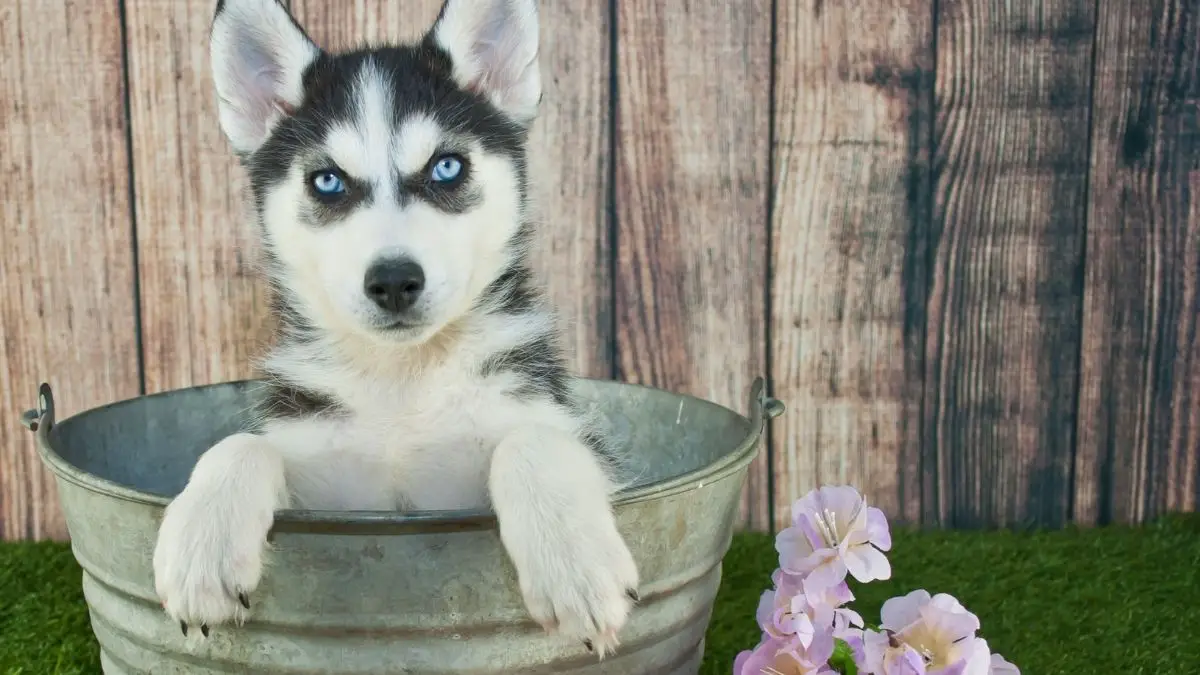How Long Can A Husky Puppy Hold A Pee? You Will Be Surprised
If you’re a novice pet parent, you may have many questions about training your pet. One of the most important aspects of training a Husky puppy is knowing how often the puppy needs to pee. Read on to find out how long puppies can hold their pee without hurting their health.
There is no standard time that a puppy can hold its bladder. It differs according to its age. Typically, a month-old puppy can hold its pee for an hour. Likewise, a two-month-old puppy can control its bladder for about two hours, and so on.
Let us dive right in and look at everything you need to know about how long puppies can hold their pee.
Table of Contents
How Long Can A Puppy Hold Its Bladder?
A newborn puppy is going to require a lot of time and attention. It cannot hold its pee for more extended periods and frequently needs to go out to urinate.
The ability of a puppy to hold its bladder increases with its age. However, it would be best if you let the change come about naturally instead of forcing it.
Let us discuss how long puppies can hold their pee at different ages. Please remember, this is just a general guide that all puppies may not strictly adhere to.
4 To 8 Weeks
A puppy will be able to hold its bladder for a maximum of one hour. You’ll have to take them out quite frequently.
8 To 10 Weeks
At this stage, it will most likely be able to hold its bladder for an hour or a bit more.
3 To 6 Months
Your puppy will grow expeditiously in this phase. An increase in its size also indicates an increase in its bladder.
Over 6 Months
Once the puppy is older than six months, its growth rate will slow down. Here on, the puppy will generally need to go out to pee once every 6 to 8 hours. The period may vary based on your dog’s health and size.
When Do Puppies Pee?
Typically, Husky puppies pee pretty often. Up to the age of 12 weeks, they pee about 12 times a day. As they grow older, they start gaining control of their bladder muscles. However, they may even want to relieve themselves as often as 15 minutes.
Unfortunately, there’s no fixed time or a set number of times a puppy will definitely pee. Nevertheless, there are few situations when a puppy generally wants to urinate. Let us discuss these situations.
After Waking Up
Much like humans, puppies too need to pee after waking up from their naps. Always take your puppies out to their potty training area when they wake up.
When Visiting New Places
Puppies tend to get overwhelmed when they come across new places or experiences. That excitement may be enough to trigger them to pee. In fact, it is not just restricted to locations. Your puppy may also want to pee after meeting a new person.
After Eating Or Drinking
Puppies can typically not hold their bladder after eating or drinking. Whenever you feed your puppy, you should take them out to their potty training area. Even if it doesn’t happen immediately, wait for some time and encourage them to urinate.
When You Get Home
Your puppy is most likely to get overwhelmed as soon as you come home. It is not just restricted to being out for the entire day, but even when you go out for a short period. As the puppy gets very excited to see you, you should take them out to pee.
After Or During Playtime
Even when puppies are playing or having fun, they get excited pretty quickly. They may be overwhelmed by the activities, which could trigger them to pee. Such situations are more common with younger puppies as they do not have much control over their bladders.
How Long Can Puppies Hold Their Pee At Night?
While young puppies can only hold their bladder for a few hours in the day, it is different at night. For example, even though a month-old puppy needs to urinate every hour while it’s awake, the system changes during sleep.
Luckily, you will not have to wake up every hour and take the puppy out to pee. There are specific potty training rules to be followed before bedtime. After that, the puppy will sleep around 3 to 5 hours without getting up to pee.
The span that a puppy can go without peeing in the night depends upon various factors, such as its size, age, and potty training routine. Although a few general observations about different age groups may help you understand the cycle better, every puppy is different.
2 To 3 Months
In this stage, your puppy will most probably not be able to make it through the night without having to urinate. It would be best to wake up and take your puppy out to pee once in the night.
At this age, the puppy cannot hold its bladder and needs to pee often. Moreover, taking them out to pee instead of letting them make mistakes in the crate will bolster your house training efforts.
If you wake up and notice that your puppy has already urinated at a given time, try waking up about 30 minutes earlier to prevent such incidents.
After 3 Months
Once the puppy reaches three months of age, you can begin the transition by letting the puppy go longer hours without waking them up during the night to pee. At this age, they start gaining some control over their bladder.
Moreover, waking the puppy up to eliminate in the night may create bad habits. Stopping this practice after three months also helps in preventing such habits from developing further.
Instead of waking up every three to five hours, start waking up later. You may make a few mistakes as you transition, but it is essential to let the puppy go longer hours without having to pee at night.
Setting a particular bedtime routine will help you in the transition process. Ensure that there is a gap of at least 2 hours between the puppy’s last meal and sleep time.
Take them out to pee just after they have their meal and once before going to sleep. After they wake up, take them out to urinate immediately.
Why Do Puppies Have Frequent Potty Training Issues?
It may be possible that even after following a proper routine, your house training efforts are not successful, and your puppy has frequent incidents where it pees out of its schedule.
The first course of action in such a scenario is consulting a vet. Once medical problems are ruled out, you should look at the possible behavioral issues.
Marking Their Territory
Puppies often pee to mark their territory. While this is commonly observed in unneutered males, both genders can have this rather unfortunate habit. It comes from their instincts.
Puppies like to showcase their control. You may find them forming this habit when a new entity is introduced to the house, be it a person or a pet. It makes the puppy feel like its position in the home is threatened.
Upon discussion with your vet, you can consider spaying or neutering your pet to control such behavior. It is generally a result of their anxiety, so it is best to help them relieve their stress, anxiety, or fear.
Excitement
Excitement peeing is commonly observed in puppies as well as some grown-up dogs. It is often referred to as puppy piddles. Many times, excitement triggers the need to pee for your puppy. It is not always about how long puppies can hold their pee. Sometimes, it is about the situation.
You may have noticed that your puppy pees when you get home or when it interacts with new people. It means that the puppy is overwhelmed by excitement. This behavior can be corrected by not paying any attention and letting the puppy calm itself down.
Such a change will not happen overnight. It will require patience and consistency. Sometimes, puppies grow out of this habit themselves as time passes.
Final Thoughts
There isn’t a rule of thumb regarding how long puppies can hold their pee.
However, specific behavioral characteristics are typically common across a given age group. These characteristics may help you understand your puppy and its schedule in a better way.
In the end, each puppy is different and has its unique cycle. Over time, the process may require a lot of effort, but you will be able to set a schedule that works both for you and your puppy.







